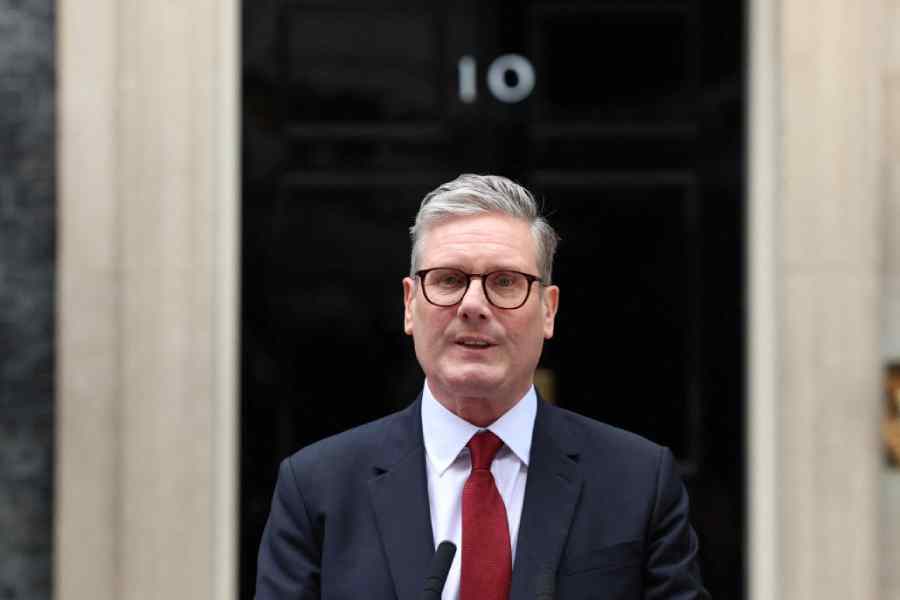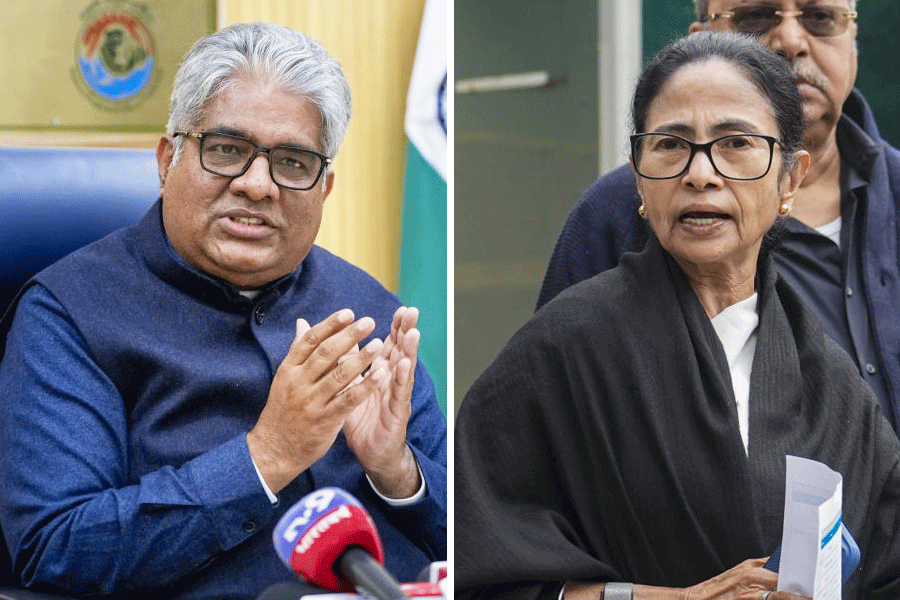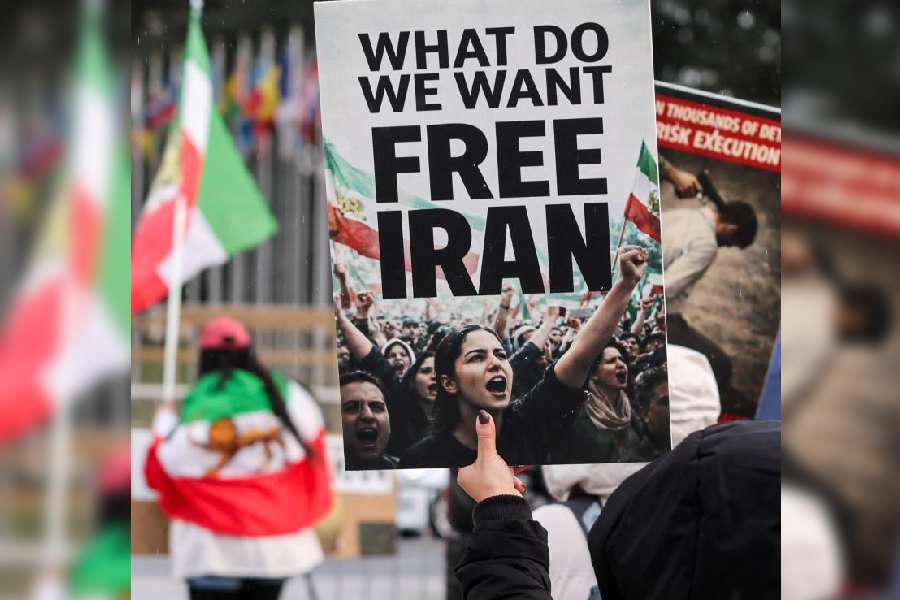It was hard to fight the elation while watching the United Kingdom election results coming in. The main thing, at many moments the only thing, that mattered was tracking, window by smashed window, the defenestration of so many Tory leaders and grandees by an enraged electorate. For anyone who has suffered directly under fourteen years of the most cruel, cynical and incompetent tenure of any modern British government, the moment was, to put it mildly, cathartic. For the last several weeks, the polls had been signalling the departure of the toxic Conservative circus; from 10 pm BST, on July 4, the exit polls (mostly reliable, unlike ours) confirmed it; and in the early hours of July 5, Rishi Sunak finally did something right when he announced that he had called Keir Starmer to tell him that he had conceded. By 11.30 am, Sunak was making the best and the most honest speech of his time as prime minister, taking responsibility for the debacle, apologising to the voters while accepting their verdict, and welcoming the opponent about to replace him as a decent and sincere man who would do his best for the country.
Within ninety minutes, a man with a very different energy was giving his first speech as the new prime minister of Britain. Starmer was measured, his jubilation tempered, his words precisely calculated towards raising the people’s spirits while managing long-pent-up desires and expectations. “We will fight until you believe...” — this statement acknowledged that the long Tory procession of performative mendacity had shredded the faith in politicians, democracy and government. He promised that this sorry sequence was now over and his government would work to earn the trust of the people. There was an overwhelming feeling that, for the first time since Gordon Brown exited this storied cul-de-sac, there was a responsible grown-up in charge of the country.
Which brings us to the inescapable phrase, ‘having said that’. There are many things to note as Starmer and his new cabinet take charge of the rickety contraption known as Great Britain. As so many have pointed out, Labour’s majority is ‘a mile wide and an inch deep’. As the snake-dance of the first-past-the-post system continues, let us savour the messy contradictions of the UK results to briefly distract ourselves from the cat’s cradle that is our own political situation.
Despite Starmer’s repeated stress on a ‘changed Labour Party’ now taking charge, the fact is that the much-maligned Jeremy Corbyn won 40% of the vote share in 2017 as opposed to the current 35% garnered by Starmer, and 32% — just 3% less — in the ‘wipe-out’ of the 2019 elections where Corbyn and the Labour campaign were energetically sabotaged by elements in his own party.
The changed Labour Party that Starmer keeps talking about refers to the ejection of Corbyn himself and the purging of the Corbynistas, which is a code for people from Labour’s left who basically backed strong, socialist policies. The reason given for Starmer’s relentlessly focused purge was that these people are anti-semitic. Among the people kicked out were Jewish leftists critical of Israel, including one eminent mathematician who was re-instated after a furore. There is a clear feeling, not least among the many young people who campaigned for Corbyn, that he was stitched up in a political hit because he was the first leader of a major Western political party who was genuinely pro-Palestine. A cold-eyed look at Corbyn’s record tells us that he misguidedly failed to distance himself from various nasty Islamist elements. But is he anti-semitic and was antisemitism rife in the Labour Party? Many secular Jewish (and Israeli) intellectuals and activists in London would answer that with an emphatic ‘no’.
The defence of Starmer’s actions is that he needed to make Labour electable again and whether he was right or wrong about Corbyn, he has succeeded. As British friends point out, Starmer is more complex than his stolid front allows you to gauge. The man has assiduously avoided committing to any policy that would get in the way of capturing votes. His general thrust seems towards transparency but his choice of means suggests he’s someone who wants to achieve his goals maybe not dishonestly but by the shortest routes available. He may — like so many of us — be a fan of the Arsenal football team and the open, attacking style of play of the manager, Mikel Arteta, but as prime minister his management will be closer to the leave-nothing-to-chance ruthlessness of a José Mourinho of the first Chelsea years (minus, of course, the crude self-aggrandisement).
Two startling Labour missteps during the election can already be attributed to this way of conducting politics: Faiza Shaheen, an excellent, secular, Muslim candidate, a working-class mother with an Oxford degree and a track record of public work, was deselected at the last minute from taking on Iain Duncan Smith, leading to that co-architect of ‘austerity’ easily retaining his seat; 27-year-old Jovan Owusu-Nepaul was put up against Nigel Farage and then stopped from campaigning because he would pull away too much media attention from Starmer’s own campaign, leaving Farage to stomp into Parliament with his fascism-covered boots.
In terms of future results for this new practicalism, here are a few things to watch. Immigration: everyone knows that Britain cannot survive without immigration but Starmer certainly isn’t going to be honest about that — yet. Two-child cap on benefits: as for the two-child cap on benefits (earlier, every child born in Britain could claim weekly benefits regardless of economic class; the Tories limited that to two children per family), Starmer says he can’t remove it but will address child poverty instead. Environment and climate change: Labour has slashed its promised allocation but it is already facing a huge pushback on this. Palestine-Israel: one of the most interesting developments is the appointment of Richard Hermer as attorney-general instead of Emily Thornberry, who was the shadow attorney-general. Hermer is Jewish; he has a great track record as a human rights barrister; he believes that the verdict of the International Court of Justice on Israel should be taken seriously and that Israel’s occupation of the West Bank is illegal; he has defended the right to campaign for the Boycott, Divestment and Sanctions movement (labelled by Israeli officials and others as anti-semitic and banned, for instance, in Germany). Starmer-sceptics suspect Hermer is there to provide cover for the Labour leader’s long-maintained support of Israel. On the flip side, in private conversations, people point out that the attorney-general is an autonomous post and is not under any party’s whip; Starmer, the canny lawyer that he is, may well have someone who can give him unpalatable advice on Israel that he’s legally obliged to follow, thus avoiding blame for this compliance.
To continue with the contradictions, despite the treatment of someone like Shaheen, this is possibly the most non-elite, non-posh cabinet the UK has ever had. Furthermore, perhaps with a view to assuaging the anger among Muslim voters, Starmer has made three ministerial appointments, two junior and one senior: Tulip Siddiq as economic secretary, Rushanara Ali as Parliament secretary for housing and, most prominently, Shabana Mahmood as justice secretary and lord chancellor.
Starmer himself is described by his biographer as someone who doesn’t like answering questions about his favourite biscuits or which sock he puts on first (or, presumably, about how he eats mangoes) and, unlike leaders who insist on being addressed with every title and honorific available, he is apparently fine with not being called ‘Sir Keir’ by people or even ‘Prime Minister’ by the bureaucrats reporting to him. Servility and obsequiousness are discouraged; subordinates are only required to deliver on their jobs.
While desperately wanting to see some of these qualities in our own leaders, those of us left-liberal-minded South Asian bystanders who have witnessed the trickster dawns of Tony Blair and Barack Obama coming to power after long, horrible years of right-wing misrule will not make the mistake of getting teary-eyed a third time. Following the UK election came the heartening results from France that show that everything is not quite lost yet in Western Europe. But we should keep proper celebrations on hold till we see how these winners and quasi-winners actually use their power.










